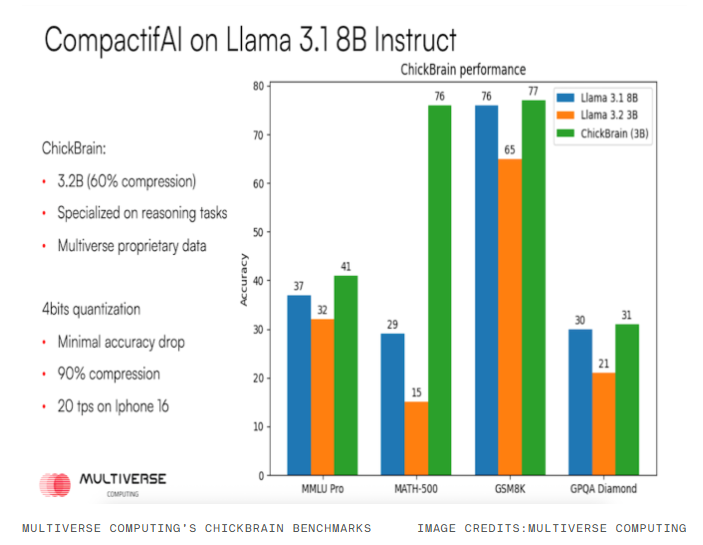European renowned AI startup Multiverse Computing recently released two extremely small AI models, so tiny that they can be named after chicken brains and fly brains. The company claims these are the smallest models in the world that still maintain high performance, capable of handling chat, speech recognition, and one of them even has reasoning capabilities.
These ultra-small models are designed for IoT devices and can also run locally on smartphones, tablets, and personal computers. Founder Roman Orus told TechCrunch: "We can compress the models to such an extent that they can fit on various devices. You can run them locally, directly on an iPhone, even on an Apple Watch."
Multiverse Computing is based in Donostia, Spain, with offices around the world, and has about 100 employees. It is a well-known European AI startup. The company was founded by Roman Orus, a top quantum computing and physics professor in Europe, quantum computing expert Samuel Mugger, and former Deputy CEO of Unnim Bank Enrique Lissaso Ormos.

In June this year, the company successfully raised 189 million euros (about 215 million US dollars) through its model compression technology called "CompactifAI." Since its establishment in 2019, the company has raised approximately 250 million US dollars in total.
CompactifAI is a quantum-inspired compression algorithm that reduces the size of existing AI models without sacrificing their performance. Orus explained: "Our compression technology is not the typical compression technique used by people in computer science or machine learning. Because we come from a background in quantum physics, it's a more refined and precise compression algorithm."
The company has released compressed versions of many open-source models, especially popular small models like Llama4Scout or Mistral Small3.1, and has just launched compressed versions of two new OpenAI open-source models. The company has also compressed some large models, such as DeepSeek R1Slim.
Focused on model miniaturization, Multiverse is putting extra effort into creating models that are as small as possible but still powerful. Its two new models are small enough to bring chat AI functionality to almost any IoT device, and they do not require an internet connection. The company humorously calls this series "Model Zoo," because the products are named after the brain sizes of animals.
The model named SuperFly is a compressed version of the Hugging Face open-source model SmolLM2-135. The original model has 135 million parameters and was developed for device-side use. SuperFly is compressed to 94 million parameters, and Orus compares it to the size of a fly's brain. He said, "It's like having a fly, but slightly smarter."
SuperFly is designed to be trained on extremely limited data, such as device operation data. Multiverse envisions embedding it in household appliances, allowing users to operate devices with voice commands, such as saying "start quick wash" to a washing machine or asking troubleshooting questions. With minimal processing power (like Arduino), the model can handle a voice interface, and the company demonstrated this live to TechCrunch.
The other model, ChickBrain, is larger, with 3.2 billion parameters, but it is more powerful and has reasoning capabilities. Multiverse states that it is a compressed version of Meta Llama3.18B, but small enough to run on a MacBook without an internet connection.
More importantly, Orus stated that ChickBrain slightly outperformed the original model in several standard benchmark tests, including the language skills benchmark MMLU-Pro, math skills benchmark Math500 and GSM8K, and the general knowledge benchmark GPQA Diamond.
It should be noted that Multiverse does not claim that its Model Zoo will beat the largest and most advanced models on these benchmark tests, and the performance of the zoo may not even appear on the rankings. The key point is that the company's technology can shrink model sizes without affecting performance.
Orus said the company is in talks with all leading device and appliance manufacturers. He said, "We are in discussions with Apple, and also talking with Samsung, Sony, and HP. HP participated as an investor in the last funding round." This round was led by a well-known European venture capital firm, Bullhound Capital, with multiple institutions, including HP Tech Ventures and Toshiba, participating.
This startup also provides compression technology for other forms of machine learning, such as image recognition, and has gained clients such as BASF, Ally, Moody's, and Bosch over six years.
In addition to selling models directly to major device manufacturers, Multiverse also offers compressed models via an API hosted on AWS, which any developer can use, usually at a lower token cost than competitors.










